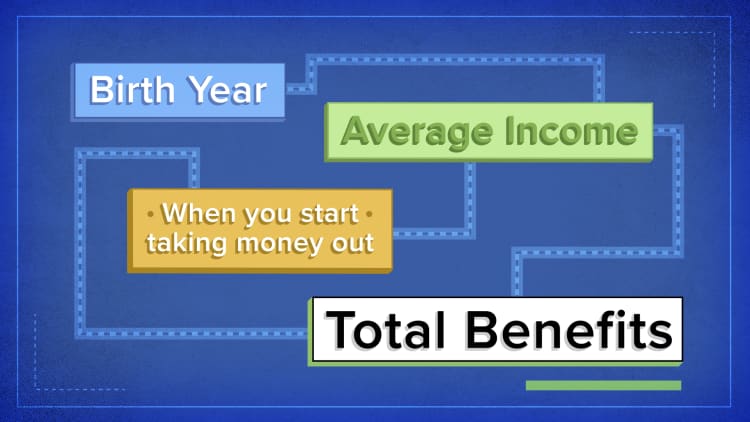When Rep. Bill Pascrell, Jr., D-N.J., visited a senior living center in Englewood, New Jersey, last week, he had one main focus: Social Security reform.
Speaking to a room full of older Americans, Pascrell painted an urgent picture of what needs to happen in order to shore up the nation's insurance program.
"Social Security is not going to die in the next couple of years," Pascrell said. "But in about 10 years, it's going to have to go into the trust to pay benefits."
More from Personal Finance:
These costs are taking the biggest bite out of retirees' wallets
Trump's Medicare reform would expand this tax-free account
How Democratic candidates would change Social Security
Social Security has $2.9 trillion in its reserves. However, with 10,000 baby boomers becoming eligible to collect retirement benefits every day, the system will face challenges in the coming years, Pascrell said.
In 2035, Social Security's combined trust funds will only be able to pay about 80% of promised benefits, according to the Social Security Administration.
"It's about time we had the guts to face what we're doing and simply not kick the can down the road," Pascrell said.
Some Washington politicians would rather wait until later and then raise the retirement age, he said. Pascrell said he sees a better way: passing a proposed bill called the Social Security 2100 Act.

Supporters of the legislation hope to bring it up for a vote this fall. Pascrell asked his constituents on Friday for help.
"You have a voice in the Congress of the United States," Pascrell said.
How Social Security 2100 would work
The campaign to win over supporters in congressional districts has been six years in the making, according to Pascrell.
That's how long the Social Security 2100 Act has been in the works, he said. Led by Rep. John Larson, D-Conn., the bill currently has 209 co-sponsors in the House. It needs 218 votes to pass. Thus far, the challenge has been getting Republican support.
In keeping with its name, the bill aims to extend the solvency of the program into the next century. The measure also aims to give workers who are or who will be receiving benefits a raise that would equal 2% of the average benefit.

To pay for those changes, the bill would raise payroll taxes. That includes what Democrats call modest increases for all workers, increasing the rate to 7.4% of wages from 6.2% between 2020 and 2043. The bill also introduces new levies for those with wages over $400,000. Currently, only wages up to $132,900 are taxed.
Other changes include using a different index for calculating the annual cost-of-living adjustment, as well as increasing the thresholds before benefits are taxed. Those would be bumped up to $50,000 for individuals and $100,000 for couples who file jointly, up from current levels of $25,000 and $32,000, respectively.
In a July committee hearing, Republicans, including Rep. Kevin Brady, R-Texas, complained that the changes could put an undue financial burden on millennials, who may pay in more than they eventually get back.
It's about time we had the guts to face what we're doing and simply not kick the can down the road.Rep. Bill Pascrell, Jr.Congressman, D-N.J.
However, some members of Pascrell's audience were receptive. That included Dorothy Cox, 77, of Englewood, who said she it always bothered her that Social Security payroll taxes were capped.
"I really think we should be increasing that, and I was glad to see that that was something that was in the legislation now," Cox said.
Backers of Social Security reform, including the advocacy group Social Security Works, hope to see movement on the bill before Thanksgiving.
"It's a perfect issue to be debated in the lead up to the 2020 election and have a vote on it," Social Security Works President Nancy Altman said.
Other changes
In addition to the reform measures in Social Security 2100, legislators have also put forward a couple of bills to address the windfall elimination provision, or WEP. That rule provides a special calculation for Social Security benefits if you have a pension from non-covered work, such as state and local government workers.
That often reduces the amount of money they receive from Social Security.
Rep. Brady introduced a bill this summer that would change the formula to give those workers a bigger slice. Recently, Rep. Richard Neal, D-Mass., introduced his own bill that would also change the WEP formula.
Neal's proposal would give retirees affected by the WEP $150 per month in relief payments, up from $100 per month promised in Brady's bill.
One key difference between the two proposals is that Neal's plan bars any new benefit reductions on roughly 18 million workers who have some earnings not covered by Social Security, and who also do not receive pensions from that work, according to Chantel Boyens, principal policy associate at the Urban Institute.
It also protects workers who might get pinched by letting them receive the higher benefit based either on the current WEP formula or the new calculation, Boyens said.
"The Neal bill is better policy because it improves benefits, and there's no losers under it," Altman said.
It is unclear whether Brady and Neal will work across the aisle to get the WEP proposals moving.
Yet Altman sees similarities between Neal's proposed WEP reform and the Social Security 2100 Act, particularly because they seek to set higher minimums and increase benefits.
"The bills, in my mind, are completely consistent," Altman said. "I think it would be great if they were combined into a single bill."



